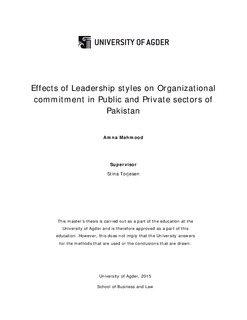| dc.description.abstract | The aim of this thesis is to depict the relationship of leadership styles and organizational
commitment in the Pakistani context. In this thesis, exploration of these variables and their
effects has been presented.
The concept of the whole thesis, the background, and significance of the study is discussed in
the first chapter. The problem statement is explained along with the research questions. A
brief illustration of the dependent and independent variables is presented.
Illustration of all the theories has linked to the thesis. As transformational and transaction
leadership is taken in connection with commitment factors, so the description of power
distance and motivation for employees is also presented. Transformation leadership is
positively linked with motivation whereas, in the transactional approach more power distance
is observed.
How power distance is associated to these leadership styles and to what extent is it affecting
employees commitment is discussed in this thesis. The main aim of the study is to analyze
the hypothesis and for that reason a theory is presented to make readers understand the
concepts.
The research design is explained in detail along with population and sample size. Then idea
of the questionnaire development is discussed and that how the interpretation is done. The
analysis of data collection is explained with detail with all the frequencies of the demographic
details of the respondents.
A frequency distribution shows the complete level of respondents’ participation and their
respective ages, degrees, departments and gender. The results of regression analysis are
correlated with the theories. These results are showing the reliability of hypothesis and that if
they are right or wrong.
From this study, it is concluded that Pakistan is following a high power distance culture in
both public and private sectors. Employees in different organizations are bound to work
because there are less available alternatives for them. They are not allowed to disclose the
insights of their company and management. Employees want to have international standards
of management practices and employee empowerment.
It is found that transformational leadership is playing a positive role in Pakistani companies
and employees in those organizations where leaders are transformational seem to be more
satisfied with their jobs than those of transactional leadership. Power distance and motivation
is playing an important role in motivating and demotivating people.
It was also noticed that people of Pakistan rely more on materialistic rewards than on verbal
motivations and this factor shows the overall economic conditions of Pakistan. Because
people are not able to meet the basic living expenses if they stop relying on bonuses and
appraisals. Therefore, a strong correlation between contingent rewards and performance has
been observed.
Key words: Transformational leadership, Transactional leadership, Affective commitment, continuance
commitment, normative commitment, power distance, Motivation, Public sector, Private sector,
Regression, Pakistan, Survey. | nb_NO |
